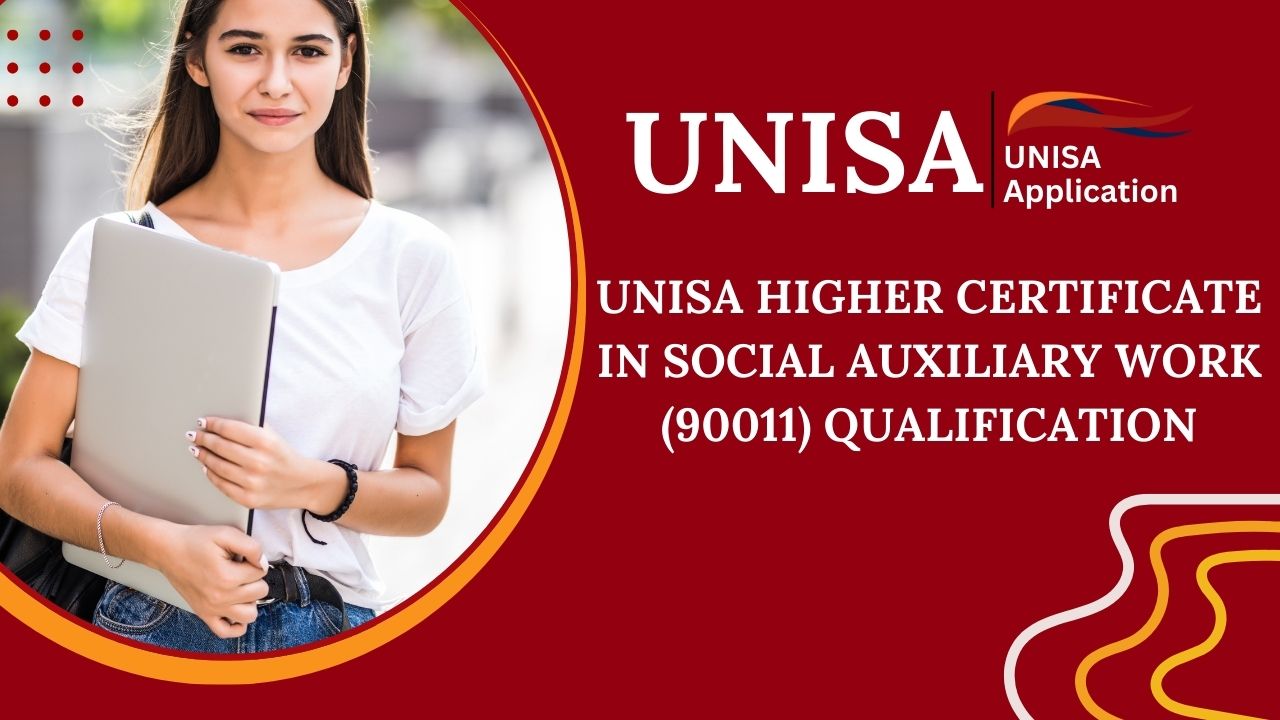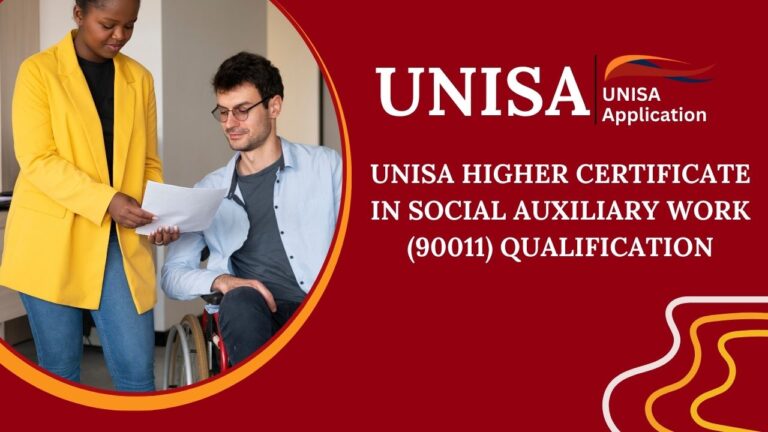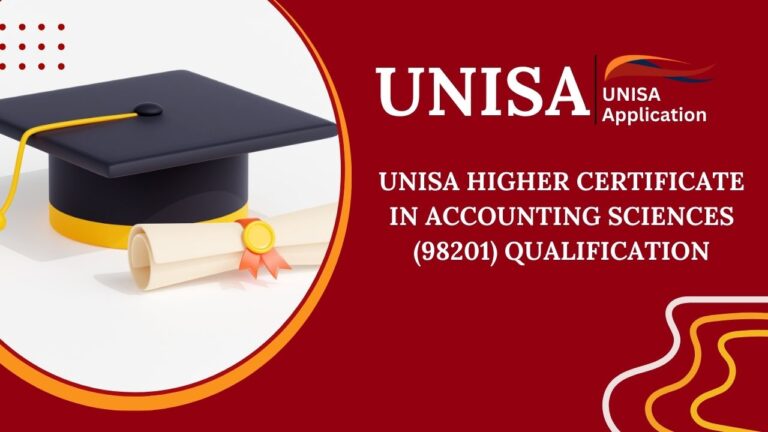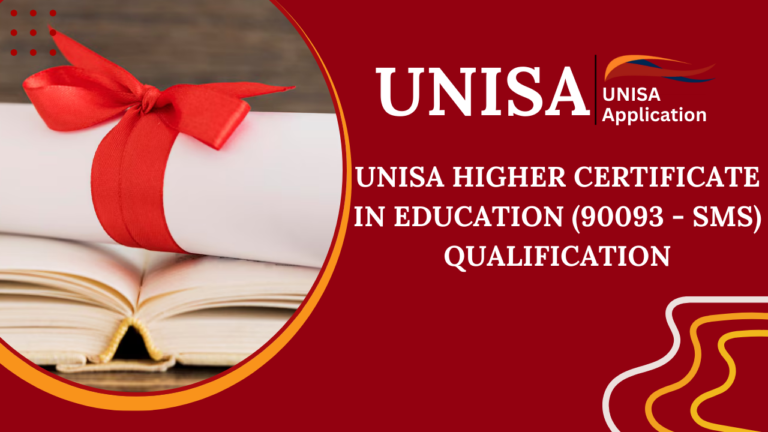UNISA Higher Certificate in Social Auxiliary Work (90011) Qualification

UNISA Higher Certificate in Social Auxiliary Work (90011) Qualification. The UNISA Higher Certificate in Social Auxiliary Work (Qualification Code: 90011) is a foundational programme designed to equip aspiring professionals with the necessary skills to provide support services within the social work sector.
Offered by the University of South Africa (UNISA), this qualification ensures that graduates are well-prepared to work under the supervision of registered social workers, contributing effectively to various social service initiatives.
Qualification Details
- NQF Level: 5
- Total Credits: 120
- SAQA ID: 93971
- APS/AS Score Requirement: 15
This programme comprises ten modules, each carefully designed to provide theoretical and practical knowledge in social auxiliary work.
Admission Requirements and Registration Process
Prospective students, including both new applicants and existing UNISA students, may register only if they have received and accepted an official offer of placement from UNISA. The university retains the right to cancel registrations if the admission process is not followed correctly.
To successfully enroll in this qualification, students must:
- Register with the South African Council for Social Service Professions (SACSSP).
- Complete Form 30 and submit it to the Department of Social Development (DSD) for processing.
- Obtain Police Clearance and provide two testimonials.
- Have access to essential study tools such as a computer/laptop, printer, and internet access.
Failure to comply with these requirements will result in an inability to register for the course.
Purpose and Objectives of the Programme
The Higher Certificate in Social Auxiliary Work at UNISA aims to develop professional competencies necessary for social auxiliary workers to support registered social workers in achieving social work objectives.
The programme covers various specialized fields of social auxiliary work, enhancing students’ ability to provide supportive services in specific focus areas.
Upon successful completion, graduates are eligible to register with the South African Council for Social Service Professions (SACSSP) as Social Auxiliary Workers.
Mode of Learning
UNISA offers this qualification through a blended learning approach, incorporating both online and distance learning modes. This flexible format allows students to manage their studies while balancing other personal and professional commitments.
Selecting the Right Modules
Every qualification at UNISA is structured to ensure students accumulate the necessary NQF-level credits within a set timeframe to qualify for graduation. Understanding module prerequisites and co-requisites is crucial when selecting courses.
Rules for Module Selection
- Co-requisite Modules: If a module is a co-requisite for another, both must be taken simultaneously. For instance, if Module A is a co-requisite for Module B, students must register for both at the same time.
- Pre-requisite Modules: Some modules require students to pass a preceding module before enrolling in the next one.
- Credit Load Limits:
- 60 credits per semester
- 120 credits per academic year
- Supplementary and non-degree purpose modules count towards these credit limits.
Time Commitment per Module
- Semester Modules: 6–8 hours per week
- Year Modules: 4–6 hours per week
Proper time management is essential for academic success.
Curriculum and Module Breakdown
Students must carefully select their modules while completing the registration process. Below is a detailed breakdown of the first-level compulsory modules for this qualification.
First-Level Compulsory Modules
| Module Code | Module Name | Prerequisites/Co-requisites |
|---|---|---|
| AFL1501 | Language Through an African Lens | None |
| APY1501 | Anthropology in a Diverse World | None |
| ENG1511 | English Proficiency for University Studies | None |
| INS1502 | Developing Information Skills for Lifelong Learning | None |
| SAW1501 | Introduction to Social Auxiliary Work | Co-requisite: SAW1503, SAW1504, SAW1506 |
| SAW1502 | Human Development and Fields of Practice in Social Auxiliary Work | None |
| SAW1503 | Social Auxiliary Work Practical Skills | Co-requisite: SAW1501, SAW1504, SAW1506 |
| SAW1504 | Integration of Theory and Practice | Co-requisite: SAW1501, SAW1503, SAW1506 |
| SAW1505 | Introduction to Social Welfare, Social Work, and Social Auxiliary Work | None |
| SAW1506 | Introduction to Social Auxiliary Work as a Profession | Co-requisite: SAW1501, SAW1503, SAW1504 |
Each of these modules plays a crucial role in building a strong foundation in social auxiliary work, preparing students for practical implementation in real-world social service settings.
Why Choose UNISA for Social Auxiliary Work?
Studying the Higher Certificate in Social Auxiliary Work at UNISA offers several benefits:
- Accredited Qualification: Recognized by SACSSP, ensuring graduates meet the professional standards for social auxiliary work.
- Flexible Learning: Designed for working professionals and students requiring distance learning options.
- Industry-Relevant Curriculum: Covers both theoretical and practical aspects of social auxiliary work.
- Career Advancement: Graduates can progress to further qualifications in social work or related fields.
- Access to Resources: UNISA provides students with digital libraries, study materials, and online support systems.
Conclusion
The UNISA Higher Certificate in Social Auxiliary Work is an excellent opportunity for individuals passionate about making a difference in their communities. This qualification provides the knowledge, practical skills, and professional registration necessary to embark on a rewarding career in social services.






